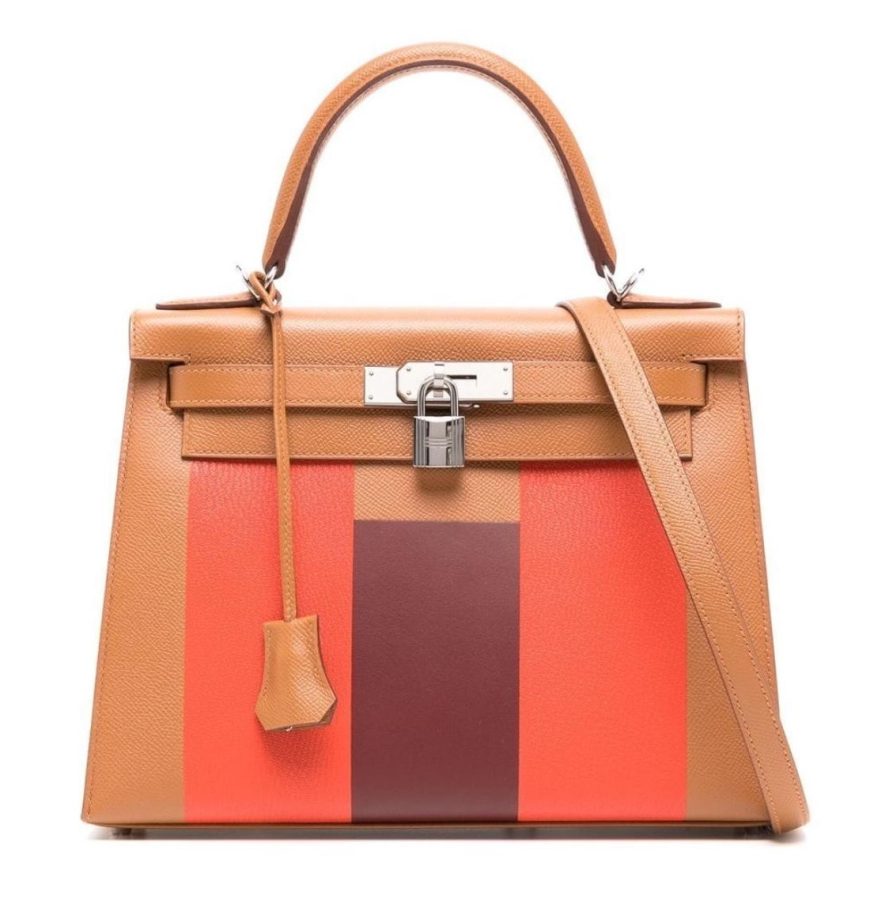The booming luxury resale market: Explained
(Farfetch, Hermes 2018 pre-owned Kelly 28 Sellier 2way bag, https://www.farfetch.com/shopping/women/hermes-2018-pre-owned-kelly-28-sellier-2way-bag-item-19471368.aspx?storeid=10031)
April 21, 2023
ERIE, Pa., March 27, 2023 – Research shows that the luxury resale market has grown four-time bigger than the primary market. Pre-owned luxury clothes and accessories represent approximately $31.1 billion in 2022 and expect to reach $51 billion by the end of 2028, according to the Business of Fashion. Undoubtedly, resale will be the next big trend in fashion retail.
The concept of buying old clothes at consignment stores or charity shops used to link with low-income neighborhoods, but everything has changed. Consignment shopping has expanded and touched on the luxury market with specialized platforms. The potential market is fueled by giant luxury conglomerates, who started to realize the power of pre-owned items.
Kering, the luxury giant which owns Gucci, Bottega Veneta, Balenciaga and other fashion houses has acquired a 5% stake in French online consignment retailer Vestiaire Collective (https://us.vestiairecollective.com). According to Vogue Business, the acquisition pushed Vestiaire’s valuation to over $1 billion. After the acquisition, Vestiaire Collective has made a further step into primary luxury retail by launching its “Brand Approved” buyback program with Alexander McQueen (owned by Kering). Customers can exchange their past-season items to earn store credit for the brand’s current collection. Following Kering, Valentino has introduced its “Valentino Vintage” initiative, which allows buyers to send their old Valentino items to selected stores in exchange for store credit.
Brands and luxury enthusiasts have several reasons to choose resale platforms as their next promised land, and these reasons are not entirely surprising. According to Vogue Business, consumer behavior has shifted significantly after the pandemic.
“Consumer interest in secondhand fashion has only grown amidst the pandemic,” says Fanny Moizant, president and co-founder of Vestiaire Collective.
Since the pandemic began, retail chains have experienced a big hit: several fashion brands filed for bankruptcy, independent designers were struggling, and department stores must shut their doors. The resale industry was one of a few areas that found its way during this dreary time. The pandemic has put a stop to physical stores and forced consumers to shop online and its long-lasting impacts are still evident, even after restrictions were lifted.
“Although the pandemic has affected all of the fashion, consumers are still shopping secondhand, particularly at vendors who are accessible online,” says Charles Gorra, CEO and founder of Rebag (https://www.rebag.com). “While stores have started to reopen, most customers still feel the safest shopping from home.”
The so-called “generational headwind” is also one of the main accelerations of these changes. Research shows that younger buyers (Generation Z and Millennials) are significantly more willing to purchase pre-owned products than older generations. Accordingly, data collected by Hypebeast shows that 69% of items available on Vestiaire Collective are under three months old, meaning consumers are actively sourcing and selling their pre-loved clothes.
“Younger generations increasingly see luxury purchases as assets that they will get some kind of return on once they are done with them, a shift away from the more sentimental attachment that older generations might have to physical goods,” said Peter Marian, trend forecaster of Future Narrative. “We are looking at younger generations having less purchasing power overall, which means that resale and rental provides a more aspirational consumer access to a brand.”
Additionally, this new market provides a more approachable way to luxury. While a new pair of Manolo could cost roughly half of the monthly salary in traditional department stores, one can find a similar pair (in never worn or particularly good condition) on resale flatforms for half of the price. The attractiveness of resale lies in its ability in offers customers decent luxury treats without hurting their bank.
Aside from obtaining new trends, Gen-Z consumers now focus more on sustainable initiatives. Resale has gradually transformed into a great alternative for fast fashion, which allows consumers to keep up with new trends while creating a circular consumption.
“As a consumer, I benefit from these platforms because it allows me to find unique pieces and give a second life to the garments I buy. It is also likable to use these platforms knowing it’s better for the environment and more ethical in general,” said fashion enthusiast Yvann Etievant. “I think the growth of reselling platforms shows that the consumer’s mentality is evolving towards more responsible consumption, and it might in the long run, makes big companies like Asos, H&M, Shein, etc… produce less. Plus, the rebirth of vintage fashion makes brands go back to their classics and so does the trends circle.”
Despite its thriving, some brands have remained on the sidelines of this market for fear of diluting their exclusivity. In 2018, Chanel filed a lawsuit against The RealReal (https://www.therealreal.com) for counterfeiting, false advertising, and unfair competition.
While Chanel sees exclusivity as a crucial element of the brand identity, it seems like consumers’ perception has changed. Luxury brands are living in a transitory time when the desire for greater sustainability is as important as the desire for exclusivity. Limited items from the secondhand market could deliver the same feeling of exclusivity as something from flagship boutiques.
“Limited capsule collections remain popular because of their exclusivity, and the same exclusivity seems to be driving the secondhand market for new or nearly new exclusive items,”
said Felipe Fiallo, men’s footwear designer at Ferragamo.
The resell platforms, undoubtedly, will continue to thrive and benefit all involved parties: it allows fashion brands to reach new clientele while buyers could experience luxury with an affordable price tag. Nevertheless, the rigorous exploding of resell companies might challenge the sustainable initiatives of this shopping trend.
While brands and resale platforms hold up reselling as a sustainability solution, critics say reselling must solve its problem first. From the consumer’s perspective, Etievant said that he has seen few indications of that happening.
“I feel like the resale market, although it is exploding right now, was more beneficial five to ten years ago. It is sad to see that it has become a business for people to go thrifting and resell what they got for ten times more money than what they paid for, as it encourages overconsumption on their side AND the price increases for consumers. Also, it creates unfair access to affordable clothes for people who can only find what they need in thrift stores such as overweight peopena le as the reselling market have made oversized clothing basically a norm.”






